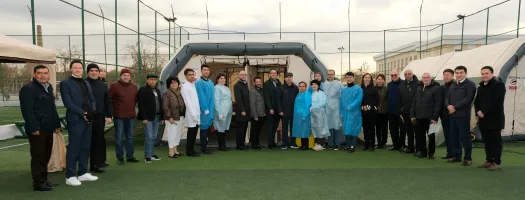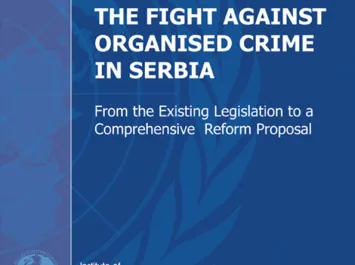Outbreaks of infectious diseases pose a substantial risk for public health, especially in remote rural areas where the disease surveillance infrastructures are often limited. In general, qualified laboratory specialists and diagnostic capabilities are mostly located in major urban centres. However, during global and local infectious disease outbreaks and pandemics it is critical that such resources are made available in remote areas to support the population and prevent potential larger outbreaks. The COVID-19 pandemic crisis has demonstrated the importance of such approach.
To support the Republic of Uzbekistan with such capacity needs, a field training exercise in the deployment of mobile laboratory units was carried out on 7-18 November 2022. This training was conducted within the framework of Project 53 of the European Union Chemical, Biological, Radiological and Nuclear Centres of Excellence (EU CBRN CoE) Initiative. Financed by the European Union, the project is implemented by the International Science and Technology Center (ISTC). The deployment of the mobile laboratory units was complemented by the Field Training Exercise held in Bukhara on 16 November 2022, to simulate the challenges posed by distant resources and to showcase the capacities of the response teams. The exercise was attended by National Focal Points of EU’s CBRN CoE Initiative from Kazakhstan, Kyrgyzstan, Pakistan, and Uzbekistan, as well as by the diplomatic corps representing the EU and Germany.
In his opening remarks, Mr. Bakhtiyor Gulyamov, Head of the Regional Secretariat for Central Asia of EU’s CBRN Centres of Excellence Initiative, and Chairman of the Committee for Industrial Safety of the Republic of Uzbekistan said: “As the ongoing pandemic has shown, with infectious diseases, nobody is safe until everybody is safe. The mobile laboratories will enhance the Government’s ability to react to biological threats wherever they arise and to leave no one behind.”
“Provision of these two mobile laboratories is an example of the European Union’s long-term commitment to supporting resilience and prosperity in Central Asian, embedded into the Strategy of the European Union on Central Asia.” Noted Mr. Wim Riepma, Head of Cooperation, Delegation of the European Union to the Republic of Uzbekistan.
Under Project 53, a series of trainings were provided by the Bundeswehr Institute of Microbiology (IMB) of Germany in using and deploying two diagnostic mobile laboratory units (conceptualised by IMB) that were handed over to the Ministry of Health of the Republic of Uzbekistan (in July 2021). These mobile laboratories are devised to allow for the analysis of diagnostic samples against a variety of pathogens in remote and rural regions, where stationary laboratory capacities are not available. The laboratories were assigned to the Republican Specialized Scientific and Practical Medical Center for Epidemiology, Microbiology, Infectious and Parasitic Diseases (RSSPMCEMIPD); and to the Research Institute of Virology (RIV). The equipment will be deployed to detect and respond to the outbreaks of highly infectious diseases.
Background information:
The EU CBRN CoE Initiative is a global Initiative funded and implemented by the European Union as part of its goal to promote peace, stability and conflict prevention.
The aim of the Initiative is to mitigate risks and strengthen an all-hazards security governance in Partner Countries of the EU following a voluntary and demand-driven approach. The EU support is provided to implement a wide range of CBRN risk mitigation activities including needs and risk assessments, national and regional action plans, capacity building activities, legal framework reviews, table top and real time (including cross-border) field exercises, inter-regional exchange of best practices and lessons learnt.
Funded and implemented through the Neighbourhood, Development and International Cooperation Instrument (NDICI) – Global Europe, the Initiative is led by the European Commission’s Service for Foreign Policy Instruments (FPI), in close coordination with the European External Action Service (EEAS). The European Commission's Joint Research Centre (JRC) provides technical support to Partner Countries, while the United Nations Interregional Crime and Justice Research Institute (UNICRI) ensures a coherent and effective national, regional and international cooperation. Other relevant International and/or Regional Organisations and experts also contribute to the Initiative, which represents the EU’s largest civilian external security programme.
The International Science and Technology Center, implementer of Project 53, has managed several hundred projects in Central Asia over the past 25 years. More information about ISTC is available at: www.istc.int


